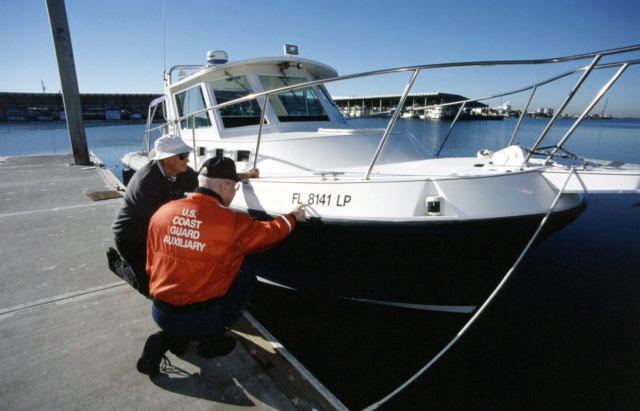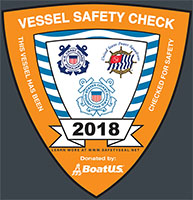 Boaters Should Learn About Boating Safety
Boaters Should Learn About Boating Safety
One of the most important safety steps you can take as a sport fishing angler is to stay as safe as possible on the water by getting an annual United States Coast Guard inspection, safety check or a VSC.
The VSC is a 15-point inspection conducted by U.S. Coast Guard approved vessel examiners. The examiners are all volunteer members of the U.S. Coast Guard Auxiliary or the U.S. Power Squadrons. It only takes about 20 to 30 minutes. When your boat passes the inspection, it will receive a VSC annual decal. The recommendation is for you to place the decal on the port side of the cabin or console.
The great part is that the vessel safety check only takes about 20 to 30 minutes and it is free. The whole point behind the VSC is to help keep boaters as safe as possible by ensuring that they have the correct safety equipment, that it is working properly and that they know how to use that equipment.
Additionally, the VSC is completely voluntary. When the examiners come on board, they are required to wear uniforms, however, they should not be confused with law enforcement in any way. There is no penalty for boaters who do not pass the inspection and therefore do not receive the decal.
Statistics reveal that over 50 percent of boats that undergo an inspection don’t receive a decal on the first try. It is important to note that boat owners should understand that a failure to pass is really an opportunity to make their vessels as safe as possible.
So, what do examiners inspect?
There are 15 items on the checklist that boaters should familiarize themselves with. This can easily be done by visiting cgaux.org and clicking on the link for “Get Vessel Safety Check”. Here is the general list of the items:
Item 1 - Display of Numbers
Item 2 - Registration / Documentation
Item 3 - Personal Flotation Devices (PFD)
Item 4 - Visual Distress Signals (VDS)
Item 5 - Fire Extinguishers
Item 6 - Ventilation
Item 7 - Backfire Flame Control
Item 8 - Sound Producing Devices / Bell
Item 9 - Navigation Lights
Item 10 - Pollution Placard
Item 11 - MARPOL Trash Placard for boats 26 feet and over
Item 12 - Marine Sanitation Devices
Item 13 - Navigation Rules
Item 14 - State and/or Local Requirements
Item 15 - Overall Vessel condition
Vessel examiners inspect many things, but among the most important are the life jackets and throwable cushions on board. The point is to ensure that all are functional. Inspections frequently uncover safety issues. For example, many boaters do not realize that each life jacket should have a whistle attached. During inspections, volunteers will often provide those whistles if the boaters don’t have them!

Expired flares are a common issue found on boats during the inspection. Flares have expiration dates telling you when each requires replacement. When it comes to replacing expired flares, you should look closely at the expiration dates on your flares. When you make the purchase of the flares, be sure that the flares have not been sitting on the shelf at the store for a year or more. The flares you buy should be freshly stocked and shouldn’t expire for at least three years.
Additionally, at times, inspections of flare kits may reveal that they don’t work. Water can enter the kit rendering the flares useless by ruining the flare cartridges. Of course, issues like these can be quickly resolved and you can get your decal by inviting the examiners back for a second look.
Additionally, at times, inspections of flare kits may reveal that they don’t work. Water can enter the kit rendering the flares useless by ruining the flare cartridges. Of course, issues like these can be quickly resolved and you can get your decal by inviting the examiners back for a second look.
Common Reasons for Not Passing Safety Check
Sometimes, inspectors can correct a problem on the spot. An example would be where boats with an LOA (length overall or the maximum length of a vessel's hull measured parallel to the waterline considered important while docking the ship) of 26 feet or greater that have an engine room, have not posted a pollution decal. A lot of examiners carry the signs or decals with them and will give them to captains who don’t have them, thereby resolving the issue immediately.
The most common reasons for a boat to fail inspection include:
Reason 1 - Absence of a boat registration.
Reason 2 - Discharged or expired fire extinguishers.
Reason 3 - Faulty navigation lights.
Reason 4 - An absence of age-appropriate life jackets (when children are aboard).
Reason 5 - Improper letters/numbers of the state registration number on the boat.
Reason 6 - Improper spacing of the state registration number on the boat.
Reason 7 - Expired or insufficient number of signal flares.
Vessel safety inspection onboard
Boaters must have a de-watering device such as a bucket or bilge pump as part of a Vessel Safety Check (VSC).
Important Boating Safety Topics That May Be Discussed
In addition to VSC decal requirements, examiners will also make some time to discuss with you some recommended items related to boating safety. Topics such as the importance of having a VHF radio, anchor and rode, first-aid kit, navigation equipment and boater education, as well as accident reporting, weather concerns, fuel management and insurance considerations, will likely come up.
VSCs also now include a discussion of how recreational boaters can aid authorities when it comes to drug interdiction and homeland security by being mindful of suspicious activities and reporting them immediately to law enforcement. Boating anglers in particular are in a position to eyeball nefarious characters on the water. The Coast Guard and U.S. Customs encourage everyone to speak up.
How to schedule a VSC
To schedule a VSC, visit cgaux.org and click on the link for “Get Vessel Safety Check.”
You may also be able to find members of the Coast Guard Auxiliary or Power Squadrons conducting VSCs at popular launch ramps and marinas on weekends, or during the boating season.
VSCs are generally conducted on a first-come first-served basis, so you there might be a wait for an examiner to become available. However, you can also schedule a VSC to come to your your house if your boat is on a trailer, or to a marina if your boat’s in the water. An examiner will work with you to find a mutually convenient time to

 Boaters Should Learn About Boating Safety
Boaters Should Learn About Boating Safety Expired flares are a common issue found on boats during the inspection. Flares have expiration dates telling you when each requires replacement. When it comes to replacing expired flares, you should look closely at the expiration dates on your flares. When you make the purchase of the flares, be sure that the flares have not been sitting on the shelf at the store for a year or more. The flares you buy should be freshly stocked and shouldn’t expire for at least three years.
Expired flares are a common issue found on boats during the inspection. Flares have expiration dates telling you when each requires replacement. When it comes to replacing expired flares, you should look closely at the expiration dates on your flares. When you make the purchase of the flares, be sure that the flares have not been sitting on the shelf at the store for a year or more. The flares you buy should be freshly stocked and shouldn’t expire for at least three years.
